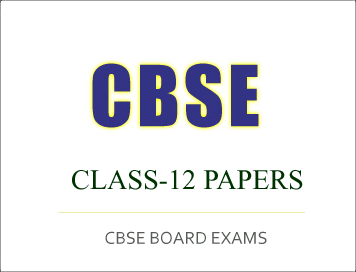CBSE Class-12 Question Papers for IOP/Comptt Examination 2017 : All India Scheme, Psychology
Disclaimer: This website is NOT associated with CBSE, for official website of CBSE visit - www.cbse.gov.in
CBSE Class-12 Question Papers for IOP/Comptt Examination 2017
All India Scheme, (Psychology)
CBSE Class-12 Question Papers for IOP/Cmptt Examination : Psychology
PSYCHOLOGY (Theory)
Time allowed : 3 hours
Maximum Marks : 70
PART – A
1. If a person has the skill of understanding motives, feelings, and behaviours of other people, he/she is said to have
(a) Interpersonal intelligence
(b) Intrapersonal intelligence
(c) Linguistic intelligence
(d) Social intelligence
2. Value judgement of a person about himself/herself is called _________.
3. The state of physical, emotional and psychological exhaustion is known as
(a) Resistance
(b) Stress
(c) Burnout
(d) Coping
4. Compulsive behavior is inability to stop thinking about a particular idea or topic.
5. A false belief that is firmly held on inadequate grounds is known as _________.
6. Empathy means understanding things from other person’s perspective. (True/False)
7. Schemes that function in the form of categories are called ________.
8. Collection of people assembled for a particular purpose is called an ________.
9. ________ is the study of the relationships between living beings and their environment.
10. The ability of a counseller to reflect on what the client says and feels using different words is known as
(a) Decoding
(b) Communication
(c) Listening
(d) Paraphrasing
PART – B
11. Explain the term phobia.
12. What is post-traumatic stress disorder ?
13. Explain existential anxiety.
14. Explain cohesiveness with reference to group formation.
15. Explain instrumental aggression.
16. Explain naturalistic observation.
PART – C
17. State the main features of trait approach to personality.
18. Explain the three components of an attitude.
19. Describe strategies for reducing aggression and violence.
OR
Describe crowding tolerance.
20. Explain the term skill. List the skills of counseling.
PART – D
21. Explain the influence of culture on intelligence.
22. Differentiate between verbal, non-verbal and performance tests.
23. Explain any two types of somatoform disorders.
24. Describe four factors which contribute to treatment of psychological distress.
OR
Explain psychological distress according to humanistic-existential therapy.
25. Explain the process of attitude formation.
26. Explain group polarisation.
